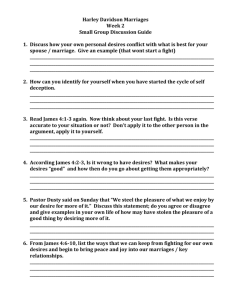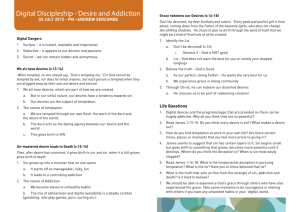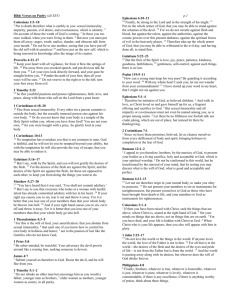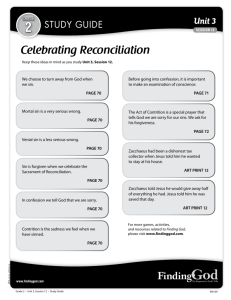The Will of God (Part 2) (slide title) In 1944, during a time when
advertisement
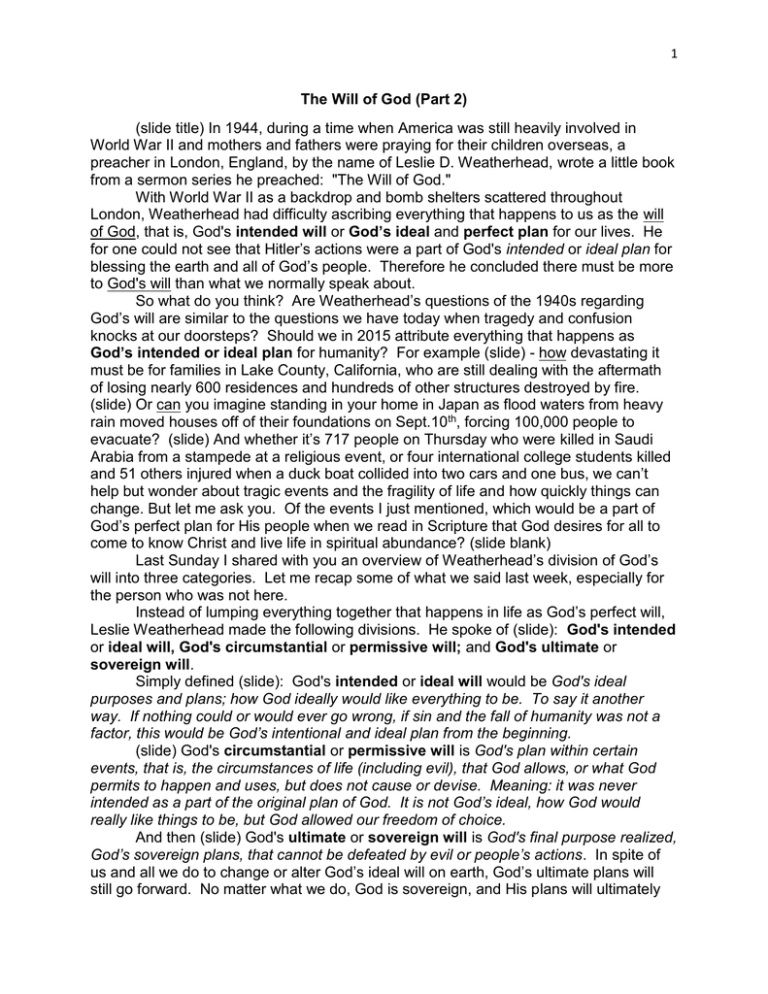
1 The Will of God (Part 2) (slide title) In 1944, during a time when America was still heavily involved in World War II and mothers and fathers were praying for their children overseas, a preacher in London, England, by the name of Leslie D. Weatherhead, wrote a little book from a sermon series he preached: "The Will of God." With World War II as a backdrop and bomb shelters scattered throughout London, Weatherhead had difficulty ascribing everything that happens to us as the will of God, that is, God's intended will or God’s ideal and perfect plan for our lives. He for one could not see that Hitler’s actions were a part of God's intended or ideal plan for blessing the earth and all of God’s people. Therefore he concluded there must be more to God's will than what we normally speak about. So what do you think? Are Weatherhead’s questions of the 1940s regarding God’s will are similar to the questions we have today when tragedy and confusion knocks at our doorsteps? Should we in 2015 attribute everything that happens as God’s intended or ideal plan for humanity? For example (slide) - how devastating it must be for families in Lake County, California, who are still dealing with the aftermath of losing nearly 600 residences and hundreds of other structures destroyed by fire. (slide) Or can you imagine standing in your home in Japan as flood waters from heavy rain moved houses off of their foundations on Sept.10th, forcing 100,000 people to evacuate? (slide) And whether it’s 717 people on Thursday who were killed in Saudi Arabia from a stampede at a religious event, or four international college students killed and 51 others injured when a duck boat collided into two cars and one bus, we can’t help but wonder about tragic events and the fragility of life and how quickly things can change. But let me ask you. Of the events I just mentioned, which would be a part of God’s perfect plan for His people when we read in Scripture that God desires for all to come to know Christ and live life in spiritual abundance? (slide blank) Last Sunday I shared with you an overview of Weatherhead’s division of God’s will into three categories. Let me recap some of what we said last week, especially for the person who was not here. Instead of lumping everything together that happens in life as God’s perfect will, Leslie Weatherhead made the following divisions. He spoke of (slide): God's intended or ideal will, God's circumstantial or permissive will; and God's ultimate or sovereign will. Simply defined (slide): God's intended or ideal will would be God's ideal purposes and plans; how God ideally would like everything to be. To say it another way. If nothing could or would ever go wrong, if sin and the fall of humanity was not a factor, this would be God’s intentional and ideal plan from the beginning. (slide) God's circumstantial or permissive will is God's plan within certain events, that is, the circumstances of life (including evil), that God allows, or what God permits to happen and uses, but does not cause or devise. Meaning: it was never intended as a part of the original plan of God. It is not God’s ideal, how God would really like things to be, but God allowed our freedom of choice. And then (slide) God's ultimate or sovereign will is God's final purpose realized, God’s sovereign plans, that cannot be defeated by evil or people’s actions. In spite of us and all we do to change or alter God’s ideal will on earth, God’s ultimate plans will still go forward. No matter what we do, God is sovereign, and His plans will ultimately 2 come to pass. (slide blank) Let me illustrate what I think we have a tendency to do when we speak of God’s will. A husband is in the hospital fighting for his life after a massive heart attack. The doctors do all they can and while in surgery - he dies. The grieving wife says: I accept my husband’s death as the will of God. Q: If it was God's intended purpose from the beginning for this man to die before he ever got on the operating table, were the doctors fighting against God's will by trying to save his life? Illustration #2: A toddler boy is left in his backyard playing with his elementary age school brothers and sisters. There happens to be a patio deck and fence around an in-ground pool. The mother steps into the house for a few minutes to prepare lunch. While the siblings are playing in the yard, the wandering toddler makes his way to the pool deck, falls in, takes in water, and stops breathing. The siblings immediately run for their mother. Mom jumps into the pool and pulls her toddler out while frantically calling 911. The closest paramedics are already assisting a call for help, so a second team farther away is summoned. The paramedics try their best to revive the child, but because of the extra time involved they essentially arrive too late. At the funeral, people say - God must have needed that child that's why God took him. God needed another little angel. It must have been God's will for the child to die now, but if only the paramedics could have arrived earlier, they probably could have saved this toddler and he would be alive today. Do you sense the confusion? It was God's will for the child to die because God needed another little angel (by the way people do not turn into angels), but if the paramedics could have gotten there in time, they could have defeated God's plan to take the toddler and saved his life. How can you have both scenarios? The toddler dying either was or was not God’s intended will. I suppose we could say there is a certain element of comfort by naming everything that happens to us, especially the bad things, as God's will. That seems to give us a future measure of hope and purpose for those senseless acts and tragic mistakes and grieving accidents. But do we really believe God takes pleasure in inflicting pain and suffering upon us? Do we really believe God intentionally wants children to have cancer and go to Mott’s Children’s Hospital, or desires babies to die in their cribs from SIDS (sudden infant death syndrome) while sleeping and cause parents to grieve? Do we really believe God desires for evil and power hungry men, such as former dictator Saddam Hussein or former terrorist Osama Bin laden, to have killed innocent people? What about ISIS chopping off the heads of Christians or anyone else they consider an infidel? You see if God were a United States citizen and organized these terrible things, we would lock Him up in prison wouldn't we? We wouldn’t put up with that. So it doesn't make sense to me, to identify something with God that our court system would penalize. Or, since I love movies, I think of the two civil war movies, Gettysburg and Gods and Generals, where you hear the commanders on both sides of the battlefronts praying for God’s will to be done as they think of friends on the other side. Q: How in the world did God, during the Civil War, answer the prayers of men and women who found themselves in opposition? Makes you think doesn’t it? When it comes to the will of God, we have so many more questions than answers don’t we? It’s something we pray for, we try to understand, and we want to 3 fulfill to honor the Lord. And perhaps in a future teaching message, we can address the idea of discovering God’s will for our personal lives, discerning the purpose and plan God may have for us. But when it comes to this general theme of understanding God’s will, there are times when you and I must agree we just don’t get it. We don’t fully understand God’s ways nor do we see the big picture how everything fits together. Yet because of our Christian faith, we hold firm to the belief that God can somehow take the worst that has happened, the greatest times of grief and despair, and somehow use them for a fitting purpose where God’s name can still be glorified. So for the remainder of our time this morning, let’s make an attempt to try to get it, to at least get some type of satisfying answer. Let’s try to get a handle on what Weatherhead referred to as God’s intentional will for our lives, and then next Sunday, we’ll pick up on God's circumstantial and ultimate will. Please keep in mind, this is only an attempt to understand something I can’t claim we do understand. I mean, how do I speak for God? How do I know if I am even close to how God operates? For the Apostle Paul reminds us in (slide) Romans 11:33-34: “Oh, the depth of the riches both of the wisdom and knowledge of God! How unsearchable are His judgments and unfathomable His ways! For who has known the mind of the Lord, or who became His counselor?” (slide blank) Yet, my hope is, to at least give you something you can hang your hat on. I would rather make an attempt to give you something that seems plausible and reasonable, than to simply say, it’s just a big mystery, we’ll never really know, so why even try. Let’s at least make an attempt. When I think of God's intentional will, I think of those things that involve the holy character and majesty of God, where God knows the beginning from the end and what is best for all involved. When I think of God’s intent, I think of creative beauty, harmony, wholeness, order, justice, fairness, life, compassion, love, goodness, and so much more. I think of a parent who desires nothing but the best he or she could give to their son or daughter, and I believe that is also God's intent, to give ultimately the best to His spiritual children. (slide) For James 1:17 tells us: "Every good thing bestowed and every perfect gift is from above, coming down from the Father of lights,...." God desires to give good things. Why? Because one quality of God's character is goodness, therefore God can only give good gifts. Do you remember Jesus speaking about prayer in Matthew 7, (slide) in a section better known as the Sermon on the Mount? Verse 11 says, "If you then, being evil (not that we are evil but in comparison to a holy God we don’t look so good), know how to give good gifts to your children, how much more shall your heavenly Father who is in heaven give what is good to those who ask Him!" God’s desire according to Jesus, God’s intent is to give us good things beyond what we could ever do ourselves. (slide blank) Let me show you what I mean. When God created and set into motion the world and the planets and stars, God said it was good. God created animals and plant life and of people (God’s ultimate creation), the Lord God said this is very good. God created a garden paradise that worked perfectly until sin entered the picture. But even after we sinned, God did not leave us stranded without any guidance. God set up dietetic laws for His people in the book of Leviticus. Why? So they could live healthy lives. To protect them. God set up laws for societal living. Why? So His people could live together in harmony. These are 4 all good things (God’s intent). But history shows us where we had problems is when we chose not to follow God’s ways. It was never God’s intent for people to murder and steal and abuse their own bodies or take advantage of others. I mean how does the golden rule, God’s intended principle of loving other people like oneself, fit in with criminal behavior? It doesn’t fit does it? I can remember when I was younger and I would visit my grandmother in the Upper Peninsula in a little town called Dollar Bay close to Houghton and Hancock. My grandmother did not lock the doors to her house. Why? Because it wasn’t necessary. People in her small town respected and cared about one another and looked out for one another. Then I think of the contrast with the city of Detroit in present day, which continues to keep its number one ranking as the nation’s top city for crime. I think about the relevance of the Ten Commandments in our present world where truth is relative and absolutes don't exist. But have you ever thought ideally, if all of us upon this spinning globe could live by just those basic ten laws, nothing else, would it be necessary to need a jail system, except for perhaps the mentally deranged? God’s intent for His people is far different than reality is it not? Well, what else can we learn from the Scripture regarding God’s intent, God’s ideal, how God would really like things to be? (slide) We read in Matthew 18:14 it is not God's ideal purpose for any child to spiritually perish. In Luke 19:10 Jesus told us He came to seek and to save the lost. 1 Timothy 2:4 proclaims God desires for all people to be saved and to come to the knowledge of truth. 1 John 3:8, informs us the Son of God appeared to destroy the works of the devil. In 2 Peter 3:9, we discover that God desires for none to spiritually die, but for all to come to repentance, and this is why God tarries so long in Jesus’ Second Coming to give everyone a chance to be saved. In 1 Peter 1:15-16, the Lord desires for us to be a holy people. In 1 Thessalonians 4:3-4,7 God’s will is for our sanctification, our purity, that we are to abstain from sexual immorality. There is an ideal way to express oneself physically within the relationship of marriage (Hebrews 13:4). Colossians 1:10 tells us we are to walk in a manner worthy of the Lord, bearing fruit in good works, increasing in the knowledge of God. (slide) This verse about good works reminds me of the story this past week that went viral as a McDonald’s cashier took time during rush hour in downtown Chicago to help an elderly handicapped man eat his meal. And I am always challenged by what it says (slide) in Romans 12:2: "And do not be conformed to this world, but be transformed by the renewing of your mind, that you may prove what the will of God is, that which is good and acceptable and perfect." (slide blank) And if we can agree that Jesus came to demonstrate in the flesh the will of heaven on earth, then we can see how God's intended will for us was to be whole - healed spiritually, physically, mentally, and emotionally. God desires for you to have comfort in afflictions, contentment, purpose, faith, eternal life, hope, humility, integrity, love, patience, self-control, trust, wisdom, absence of worry and fear, peace, honor, success, safety in God’s protection, joy, forgiveness, fruitful relationships, healing of past hurts, your basic needs being met, being a good steward, being an ambassador - an example of Christ to others; why God’s intended list for you goes on and on. Now if what I have said is true, that God from the very beginning has had all these ideal purposes for us and more, then what's the problem? Why do we not 5 experience God's intended will for our lives in all of its fullness? One answer we may quickly come to is sin and the presence of evil and I would agree with that as part of the answer. But let me suggest another piece that may sound at first a bit heretical. I would like to suggest that man's freedom (that is our free will) can sometimes defeat God's ideal purposes or what God intended for us from the beginning. Let me illustrate. A young man or woman from a large city goes to school to study medicine and eventually becomes a fine surgeon. On a Christmas holiday break this surgeon visits their hometown and neighborhood by driving home. Traffic is heavy. Weather conditions are slippery. And a reckless driver, who is speeding and has been partying too much, collides into the car in front of him causing a chain reaction of multiple collisions. The surgeon unintentionally, without notice, becomes involved in this pile up. Sadly, the nerve endings in the surgeon’s hands are damaged by the accident. The surgeon’s dreams of future surgery are now gone. However, this doctor continues to use their much needed medical skills and knowledge helping the poor in a downtown clinic with a family practice. So, out of a bad situation, good still arises. Now what was the intent of this young doctor? The intent was to be a surgeon was it not? However, because of real life events, they ended up trading an operating room for a clinic. Things got changed or fouled up because of someone's carelessness and selfishness, thinking only of themselves by drinking and driving. I would like to call that sin and the abuse of freedom or free will. In a similar way, I think God's intended will (what God really wants for us, God’s ideal for us, how God would really like things to be), can get fouled up because of sin and our abuse of freedom. And yet there is good news. God is still able to bring about something good, though it is different than what was originally intended. Or let me ask you this? Have you ever made a regrettable mistake, something you look back upon and wish you could re-live because it changed the course of your life? It was never your intention. It wasn’t a part of the ideal plan, but it happened. I believe our freedom to act and make decisions can impact God's ideal will for our lives and at times, even other lives. For instance the Scripture says in (slide) Psalm 127:3 that "...children are a gift of the Lord;...." Well what happens if I abuse that gift? As an adult, can I scar a child emotionally from what I say and physically by what I do? Yes I can. And yet God's intent is for the child to be seen and treated as a gift. I’m sure you’ve read or heard about sexual predators using the Internet to contact teens, or men using their cell phones to take pictures up women’s skirts. (slide) Or do you remember hearing in August about Jared Fogle from the Subway commercials who was arrested for child pornography and paying for sex with minors? My freedom to act as I choose can work against God’s intent when I do not follow God’s ideal. (repeat) (slide blank) So here’s the dilemma. If it is possible for us to mess up God's intended will by our freedom of choices leading to sin, or when we choose to follow our own will instead of God’s intended will, then don’t we need some reassurance that somehow God can fix things, that God is still powerful enough to make things right? Well I believe the answer is “yes” which is what we will explore next week. But let me say this for now. God ideally has good plans for us. And where sin and evil came to intrude upon and destroy those plans, Jesus came to restore and heal and help us start all over with new plans. And that my friends is good news we can count on and it’s good news worth sharing with others.


